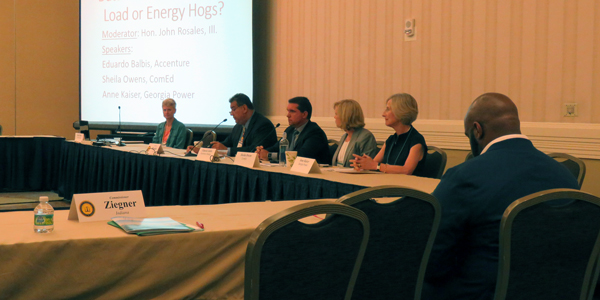By Jason Fordney
SAN DIEGO — The digital economy is driving construction of a massive amount of data and storage infrastructure that has many implications for the electricity grid, industry participants and regulators said last week.
Data centers are seen by states as bringing economic development, but they also create electricity and water demand that requires attention from regulators. Utilities and municipalities are designing tariffs specifically for data centers, which require significant infrastructure development within a certain utility footprint, Illinois Commerce Commissioner John Rosales said at a July 17 panel of the National Association of Regulatory Utility Commissioners’ Summer Policy Summit.
Rosales and others noted that the demand for data and storage infrastructure will only grow. “We are not putting down our smartphones or tablets anytime soon,” he said.
Commonwealth Edison Vice President Sheila Owens said that Northern Illinois houses 70 data centers with aggregate demand of more 200 MW, the largest 15 of which have annual demand growth of about 20% a year. She noted a dramatic statistic: 90% of the data ever created were generated in the past two years.
“Data centers are the manufacturers of the 21st century in our digital economy,” Owens said. She added that Chicago’s transportation access and colder climate benefit data center efficiency by reducing cooling costs.
Data centers have a high incentive to use energy and water efficiently, and many companies have sustainability offices that research siting concerns for them, Owens said. Legislation in Illinois has created incentives for using solar credits to commercial facilities. Data center operators tend to be interested in clean energy.
Former Florida Public Service Commissioner Eduardo Balbis said the number of data centers will increase in the U.S. as new technology, such as autonomous vehicles, is developed. He urged that state regulators partner with data center operators on energy-usage programs in order to attract the facilities.
States are now waiving taxes to account for data centers or adjusting rates, and regulators should give utilities flexibility to partner with data center operators, said Balbis, now managing director of Accenture Strategy.





